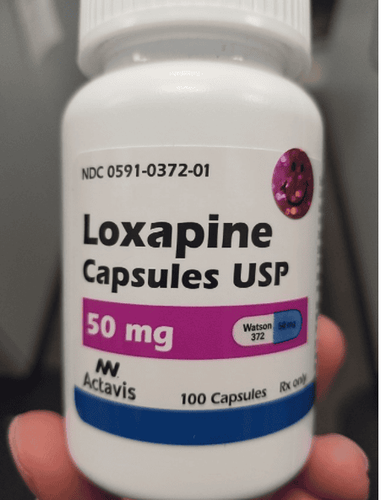This is an automatically translated article.
Loxapine belongs to the class of antipsychotics, used to treat the symptoms of schizophrenia - a mental illness that causes disorder or abnormal thinking, loss of interest in life, and strong emotions .
1. What does Loxapine do?
Loxapine is a drug that works in the brain to treat schizophrenia. It is also known as a first-generation antipsychotic (FGA) or a typical antipsychotic. Loxapine helps rebalance dopamine to improve thinking, mood, and behavior.
Symptoms of schizophrenia include:
Hallucinations - imaginary voices or images that seem real Delusions - beliefs that are not true (e.g. someone else is reading your mind) Disorganized thinking or difficulty organizing thoughts Little desire to be with others Difficulty speaking clearly Lack of motivation

Loxapine thuộc nhóm thuốc chống loạn thần thế hệ thứ nhất
2. How to use Loxapine
Take this medication by mouth, usually 2 to 4 times daily with or without food.
If you are using the liquid form of this medicine, carefully measure the dose with a special measuring device/dropper and mix it in liquid or soft food (such as apple sauce, pudding) just before use.
Your doctor will likely start you on a low dose of loxapine and increase your dose for the first 7 to 10 days of treatment until your symptoms are under control. Once your symptoms have been under control for a while, your doctor may reduce your dose. Be sure to let your doctor know how you are feeling during treatment with loxapine.
Although you may notice some improvement in your symptoms soon after you start taking this medicine, it may take weeks to months before you get the full benefits of this medicine. Schizophrenia is a medical condition that requires long-term treatment. Do not stop taking loxapine on your own, even if you feel better. Forgetting to take loxapine can increase your risk of a recurrence of your symptoms.
3. Loxapine side effects
Drowsiness, dizziness, lightheadedness, constipation, dry mouth, weight gain or blurred vision may occur, increasing the risk of falls especially in the elderly. Therefore, the patient needs to get up slowly when moving from a lying or sitting position.
Loxapine may cause muscle/nervous system problems (extrapyramidal symptoms). Your doctor may prescribe another medicine to ease these side effects. Therefore, tell your doctor right away if you notice any of the following side effects: Muscle stiffness, severe muscle spasticity/cramps (such as twisting your neck, arching your back, rolling your eyes up), ferret / does not stop moving, shaking (tremor), walking slowly / clack, drooling / difficulty swallowing.
Tell your doctor right away if you have any serious side effects, including: Easy bruising/bleeding, fainting, depression/suicidal thoughts, difficulty urinating, signs of infection (such as fever, persistent sore throat), seizures, severe stomach/abdominal pain.
This medicine may cause a condition called tardive dyskinesia. Tell your doctor right away if you develop any involuntary/repetitive muscle movements such as biting your lips/puckering your lips, tongue thrusting, chewing, or finger/toe movements.
In rare cases, loxapine may increase levels of certain chemicals made by the body (prolactin). In women, this increase can lead to unwanted lactation, late or stopped periods, or difficulty getting pregnant. For men, there may be decreased sex drive, decreased sperm production, or enlarged breasts.

Sử dụng thuốc loxapine có thể dẫn đến chóng mặt, choáng váng
4. Be careful when using the drug Loxapine
Before using this medication, tell your doctor or pharmacist your medical history, especially of: Blood problems (such as low white blood cell, red blood cell, platelet count), medical conditions certain eyes (glaucoma), heart problems (such as fast/irregular heartbeat, low blood pressure), liver disease, brain disorders/tumors/trauma, drug/alcohol abuse / narcotics, breast cancer, Parkinson's disease, epilepsy, a certain severe reaction to other antipsychotic drugs (neuroleptic malignant syndrome-NMS), difficulty urinating (such as due to prostate problems).
This medicine may make you dizzy, drowsy, or blurred vision. Alcohol can make you more dizzy or drowsy.
Before undergoing surgery or performing imaging tests (such as X-rays, CT scans) that require the use of contrast agents (such as metrizamide), tell your doctor that you are undergoing treatment. treated with this drug.
Older adults may be more sensitive to the side effects of this drug, especially somnolence, dizziness, lightheadedness, extrapyramidal symptoms (EPS) and tardive dyskinesia, which may increase the risk. risk of falls in the elderly.
Tell your doctor if you are pregnant, especially if you are in the last few months of pregnancy, or if you plan to become pregnant or are breast-feeding. If you become pregnant while taking loxapine, call your doctor. Loxapine can cause problems in a newborn baby after birth if it is taken during the last months of pregnancy.
You should be aware that loxapine can cause dizziness, fainting and lightheadedness, especially when you get up from a lying position. To avoid this problem, get out of bed slowly, resting your feet on the floor for a few minutes before standing up.
5. Drug interactions
Some drugs that may interact with this drug include: metoclopramide, certain drugs used for Parkinson's disease (such as bromocriptine, levodopa, pergolide).
Tell your doctor or pharmacist if you are taking medicines that can cause drowsiness such as opioid pain relievers or cough suppressants (such as codeine, hydrocodone), alcohol, sedatives (such as alprazolam, lorazepam, zolpidem). ), muscle relaxants (such as carisoprodol, cyclobenzaprine), or antihistamines (such as cetirizine, diphenhydramine).
Double-check the labels on all your medicines (such as allergy or cough and cold products) as they may contain ingredients that cause drowsiness.
Please dial HOTLINE for more information or register for an appointment HERE. Download MyVinmec app to make appointments faster and to manage your bookings easily.
Reference source: webmd.com













